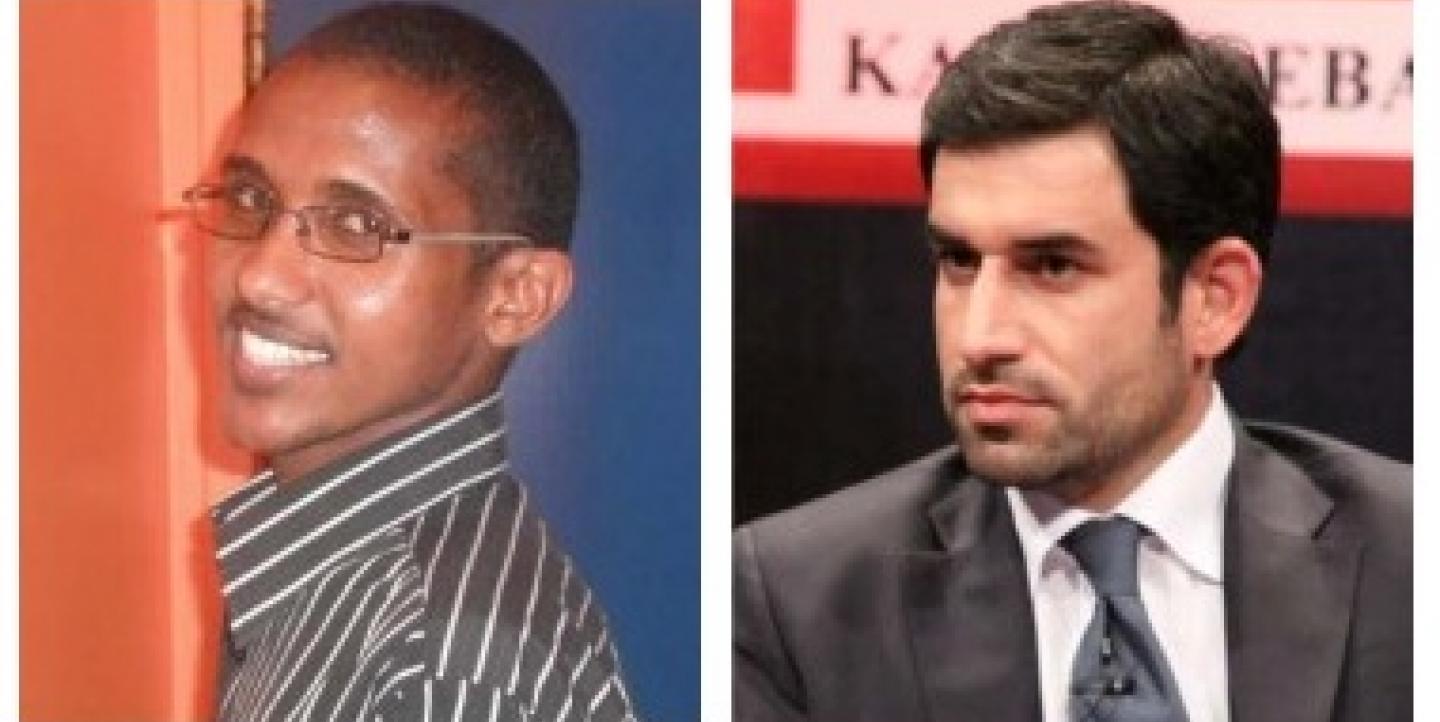From being held hostage by Somali pirates to promoting women’s rights in Kabul, this year’s Knight International Journalism Award winners were recognized for their brave work.
The International Center for Journalists honored Kassim Mohamed of Kenya and Sami Mahdi of Afghanistan at its annual Awards Dinner. The award recognized their brave work pushing the limits of their nations’ news coverage.
Mohamed, senior correspondent for Star FM, and Mahdi, news director for 1TV, sat down with IJNet to talk about what they've learned from interviewing trauma survivors, digging deep for an investigative story and keeping sources confidential.
Kassim Mohamed
Mohamed grew up in northeast Kenya, a region where people live in dire conditions and are largely ignored by the government. His first story as an investigative journalist broke big. He exposed district officials who were selling food aid instead of delivering it to those in need, and the officials were fired. He went on to cover Somali pirates and their wives, gang violence in Kenya and more.
Mohamed experienced a trauma of his own when he was held hostage by Somali pirates while on assignment, though he managed to secretly record his experience.
“I learned a lesson. I was still kind of naive and I decided to go to this place that I’d never been to...That for me was a learning point,” he said. “No story is worth your life, but sometimes you have to dig deeper. Take risks but [only] to a certain extent.”
Mohamed had to maintain journalistic integrity throughout his assignment in Somalia, keeping sources confidential even when the international community considered these pirates criminals.
“We are not police officers. It’s not my job to go and arrest that pirate; it’s my job to tell the story,” he said.
Throughout his career covering social justice issues, Mohamed has learned to handle sources who have had traumatic experiences. He interviewed a woman who was raped by 12 men after a disputed 2008 presidential election in Kenya spurred a streak of ethnic violence.
After experiencing the victim’s distress during the interview, he had to seek counseling himself and feared the interview did more harm than good.
“Instead of adding more damage to somebody’s plight, you have to think about them as a human being as well,” he said. “When somebody tells you, ‘Don’t use my name or picture,’ don’t do it. They trusted you, and that would just be adding more fuel to their problem.”
In this audio clip, Mohamed describes another trying assignment in 2011. He walked with Somali refugees to Dadaab, Kenya, as they fled a famine-inducing drought.
Sami Mahdi
Mahdi began his journalism career when he was in exile in Tajikistan, writing articles for his father’s newspaper. He received a degree in law and political science, but once stringent restrictions on freedom of expression were lifted with the Taliban collapse, Mahdi rethought his options.
“Free media was something new for the country,” he said. “It was an opportunity to make your future and become a different person.”
He re-entered the journalism world as a broadcaster at 1TV, covering domestic abuse, violence and politics. Mahdi pioneered and produced Niqab (The Mask), a series in which domestic abuse victims tell their stories while wearing a mask to protect their identities.
It took more than a year to convince the first woman to appear on Niqab, because these kinds of stories are considered taboo in Afghanistan, he said. Even human rights organizations, shelters and safe houses resisted helping identify women to appear on the show because revealing these situations puts the victims at such high risk.
“When you’re touching on these kinds of issues in society, you’ll get a lot of negative reactions, and the women think that if they come to our TV show they would face more violence,” he said.
The first step when approaching a trauma victim is to express understanding, Mahdi said.
“In a country like Afghanistan, when a woman is a victim she is a victim forever--she is the victim and people think she is the criminal as well,” he said. “She can’t go to the judiciary system or the police. All the laws are supporting her, but the mindset of the people is not supporting her, so the first thing she needs is sympathy.”
In this audio clip, Mahdi elaborates on the difficult task of gaining a trauma victim’s trust.
The Knight Award gives Mahdi a higher profile that he plans to use to redouble his efforts to reduce violence.
“In my country we've experienced violence for three decades now, and still it’s going on," he said. “If TV stations and journalists concentrate on promoting nonviolence, I’m sure it will make a difference for the future.”
Photo of Kassim Mohamed (left) and Sami Mahdi (right) courtesy of Knight International Journalism Fellowships.

